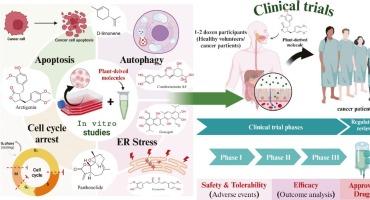从膳食多酚中提取抗癌天然化合物的机理和临床观点
IF 4
2区 农林科学
Q2 FOOD SCIENCE & TECHNOLOGY
引用次数: 0
摘要
近年来,植物衍生分子的治疗潜力吸引了越来越多的科学和临床兴趣,主要是因为它们在化疗药物开发中的关键作用,大约74%的抗癌化合物直接来源于或受自然来源的启发。许多已发表的评论探讨了这些化合物的药理作用;然而,另一些人只专注于检查一两个已经进入临床试验的特定分子。此外,大多数现有的综述倾向于列举大量化合物,而没有提供使某些植物源分子能够进入临床阶段的特征和特征的详细分析。这篇综述的目的是阐明17种来自植物的分子的作用机制,这些分子在临床上已被证明可以调节癌细胞的关键细胞过程,包括细胞周期阻滞、自噬和内质网应激。通过强调这些分子的共同特征和赋予其临床效用的独特性质,这项工作为其转化潜力提供了有价值的见解。此外,本综述还讨论了各种药物传递技术,这些技术已被用于阻碍其临床有效性的几个挑战,包括有限的溶解度,差的生物利用度和低稳定性。本文章由计算机程序翻译,如有差异,请以英文原文为准。

Mechanistic insights and clinical perspectives on anticancer natural compounds from dietary polyphenols
In recent years, the therapeutic potential of plant-derived molecules has attracted growing scientific and clinical interest, largely due to their pivotal role in the development of chemotherapeutic agents, with approximately 74% of anticancer compounds being directly derived from or inspired by natural sources. Numerous published reviews have explored the pharmacological effects of these compounds; however, others have focused exclusively on the examination of one or two specific molecules that have advanced into clinical trials. Furthermore, the majority of available reviews tend to enumerate a multitude of compounds without providing a detailed analysis of the characteristics and features that enable certain plant-derived molecules to progress to the clinical phases. The objective of this review is to elucidate the mechanisms of action of 17 molecules derived from plants clinically tested have been shown to regulate critical cellular processes in cancer cells, including cell cycle arrest, autophagy, and endoplasmic reticulum stress. By emphasizing the common characteristics and distinct properties that confer clinical utility on these molecules, this work provides valuable insights into their translational potential. Additionally, this review also discusses the various drug delivery technologies that have been employed to several challenges that hinder their clinical effectiveness, including limited solubility, poor bioavailability, and low stability.
求助全文
通过发布文献求助,成功后即可免费获取论文全文。
去求助
来源期刊

Journal of Functional Foods
FOOD SCIENCE & TECHNOLOGY-
CiteScore
9.60
自引率
1.80%
发文量
428
审稿时长
76 days
期刊介绍:
Journal of Functional Foods continues with the same aims and scope, editorial team, submission system and rigorous peer review. We give authors the possibility to publish their top-quality papers in a well-established leading journal in the food and nutrition fields. The Journal will keep its rigorous criteria to screen high impact research addressing relevant scientific topics and performed by sound methodologies.
The Journal of Functional Foods aims to bring together the results of fundamental and applied research into healthy foods and biologically active food ingredients.
The Journal is centered in the specific area at the boundaries among food technology, nutrition and health welcoming papers having a good interdisciplinary approach. The Journal will cover the fields of plant bioactives; dietary fibre, probiotics; functional lipids; bioactive peptides; vitamins, minerals and botanicals and other dietary supplements. Nutritional and technological aspects related to the development of functional foods and beverages are of core interest to the journal. Experimental works dealing with food digestion, bioavailability of food bioactives and on the mechanisms by which foods and their components are able to modulate physiological parameters connected with disease prevention are of particular interest as well as those dealing with personalized nutrition and nutritional needs in pathological subjects.
 求助内容:
求助内容: 应助结果提醒方式:
应助结果提醒方式:


